J. Peterman Returns
John O'Hurley, National Dog Show
 You might remember him from Seinfeld. He was the first winner on Dancing With The Stars and was once People's Sexiest Man of the Year. John O'Hurley, host of the National Dog Show on NBC, is back to spread Thanksgiving cheer and Holiday warm-fuzzies all over Animal Radio airwaves.
You might remember him from Seinfeld. He was the first winner on Dancing With The Stars and was once People's Sexiest Man of the Year. John O'Hurley, host of the National Dog Show on NBC, is back to spread Thanksgiving cheer and Holiday warm-fuzzies all over Animal Radio airwaves.
The National Dog Show on NBC is a Thanksgiving tradition for 25 million pet-lovers. The show is hosted by John O'Hurley and David Frei, with John stating that out of the two, he is the "style" and David is the "substance!"
The annual NBC Thanksgiving Day broadcast is set for November 23rd on NBC, immediately following the Macy's Thanksgiving Day Parade. A total audience of some 25 million viewers is expected to watch the broadcast, from noon-2 p.m. in all time zones. There will be 1,500 - 1,700 dogs from 180-plus breeds at America's second-oldest show.
The National Dog Show actually goes on for several days, with viewers only getting to see a small part of the final judging. However, there is an online version of the show where you can view all of the dogs in each category.
John tells us it's not always easy to say the names of the different dog breeds and that they pulled a fast one on him when they added the Mexican Hairless Dog, otherwise known as the "Xoloitzcuintli," several years ago. John said he spent a considerable amount of time looking in his mirror when he was shaving, repeating the name of the breed over and over again so he could get it right come show day, because he was only going to get one chance to say it right!
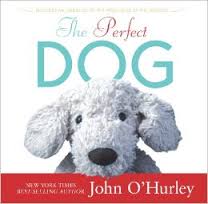 At home, John has a Cavalier King Charles named Sadie and a Havanese named Lucy. John says that everything he knows about dogs he learned at the National Dog Show from the breeders and from walking up and down the aisles full of dogs. So when he was looking for new family members, he knew what type of dogs he wanted. John states that dogs are not trials. You should learn about the dog you are interested in and shouldn't get a dog to try it out and see if it will work. The shelters are unfortunately full of too many dogs that were trials.
At home, John has a Cavalier King Charles named Sadie and a Havanese named Lucy. John says that everything he knows about dogs he learned at the National Dog Show from the breeders and from walking up and down the aisles full of dogs. So when he was looking for new family members, he knew what type of dogs he wanted. John states that dogs are not trials. You should learn about the dog you are interested in and shouldn't get a dog to try it out and see if it will work. The shelters are unfortunately full of too many dogs that were trials.
John is a busy man and even wrote a children's book, "The Perfect Dog," which was turned into a musical. The Perfect Dog is about Sam, a twelve-year-old perfectionist, who searches for a flawless dog to enter in the town's dog contest. Unable to find a canine that measures up, Sam must resort to training the family dog, Max, who is less than eager to obey commands. In the end, Sam and Max learn that there is no such thing as perfect, but there is such a thing as being perfect for each other.
Visit Website
"HERO PEOPLE OF THE WEEK" - Laura Leland Montague
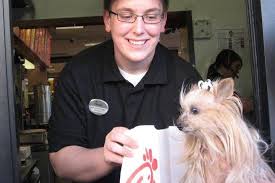 Laura Leland Montague of Chino Hills, California helps all animals that are in need whether injured or lost. She even has her own scanner to scan for chips when animals are lost and acts as a transport when they need a vet or more help. She does all of this and more on her own time and own dollar and at all hours of the day or night. No matter what type of animal, be it dog, cat, bird or any wild one, she is always around to help!
Laura Leland Montague of Chino Hills, California helps all animals that are in need whether injured or lost. She even has her own scanner to scan for chips when animals are lost and acts as a transport when they need a vet or more help. She does all of this and more on her own time and own dollar and at all hours of the day or night. No matter what type of animal, be it dog, cat, bird or any wild one, she is always around to help!
Laura tells us that a woman who belongs to her Facebook group called Chino Hills Connections started a GoFundMe Campaign because people were always going to Laura to help them with lost and found animals. They were able to raise the $450 in their community to purchase a scanner. Because of this, Laura has become the official microchip scanner for Chino Hills around the clock. It doesn't matter what time it is, if someone finds a dog and can't make it to a location to check for a scan, Laura will go to their location and scan the dog for them. She wants to make it as easy as possible to get dogs back to their owners.
Once an animal has been found, Laura tries to find their owners by hanging posters in her city (at her own expense), she also posts them on multiple Facebook pages like Nextdoor.com, Craigslist and even in newspapers (most people don't know that most local newspapers will run an ad for free if you find an animal). If this doesn't get a response, Laura will often times go door to door, knocking on upwards of 30 houses searching for an owner.
Laura has a pretty good success rate and usually gets these animals back to their owners. Over the years, she has also rescued many dogs and cats as well as rabbits, chickens and pigeons.
 Don't Stuff Your Pet With Thanksgiving Leftovers -Dr. Debbie
Don't Stuff Your Pet With Thanksgiving Leftovers -Dr. Debbie
Thanksgiving is all about enjoying time together - family, friends, and great food. In many households the family pet may also sample a taste from the holiday table; a morsel of turkey breast for Tabby or a side of fixings for Fido. Tuned in to those enticing smells, our pets know how to manipulate us with a flutter of sad puppy dog eyes or incessant meowing.
Sharing these Thanksgiving goodies with our pets can put their health in jeopardy, but many of us do it. Over 60-percent of pet owners confess to sharing their holiday meal with their pets, but that doesn't make it wise.
Here's why:
Dog's and cat's digestive systems thrive on a stable, consistent diet. Toss in a few leftovers and your pet will respond with a thankful tail wag, but could leave him with gastroenteritis, and leave you with vomit and diarrhea messes sprinkled about the house.
Sharing Thanksgiving leftovers can risk more than just an upset belly though. Feeding human food to our pets can trigger pancreatitis, an inflammation of the pancreas that results in release of digestive enzymes into the abdomen. Pets with pancreatitis develop vomiting, diarrhea, lack of appetite and abdominal pain, often demonstrated by a hunched abdomen. Pancreatitis is painful and life-threatening and may result in bleeding disorders or heart arrhythmias. Treatment for pancreatitis includes hospitalization, intravenous fluids, pain medications and anti-nausea medications.
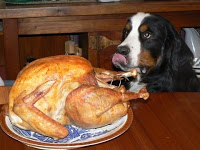 Pancreatitis risk is greatest in obese pets or those that ingest especially fatty foods like greasy meat trimmings, sauces and other rich side dishes. Be especially cautious with Schnauzers, who have an increased risk of pancreatitis due to breed predisposition.
Pancreatitis risk is greatest in obese pets or those that ingest especially fatty foods like greasy meat trimmings, sauces and other rich side dishes. Be especially cautious with Schnauzers, who have an increased risk of pancreatitis due to breed predisposition.
Thinking of handing that turkey bone to your dog? Fugettaboutit! Any bones, even cooked bones, have the potential to splinter, damage the digestive tract, or cause an intestinal obstruction. Bone chewing also leads to damaged, chipped teeth which may require root canal surgery or surgical removal. You are better off to just brush those pearly whites than risk tooth pain and a costly dental procedure.
If you are looking for a safer way to include your pets in the holiday cheer, have a handful of pet treats on the ready. Better to stick with snacks you are certain will agree with your pet's digestive system. But if you must look on the table for your pet's treat, offer a small amount of white turkey meat without the skin or bones. Skip the sides, sauces and deserts. And be wary of foods that are toxic to pets such as raisins, grapes, onions, macadamia nuts and chocolate.
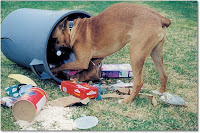 After the meal is done, do a thorough cleanup and discard the turkey bones in a secure, outdoor garbage can away from pet access. Store leftovers in the refrigerator or where pets cannot reach them. Keep on the watch for the curious pets with a nose for trouble. Pets will ingest the turkey string, foils and any items with juices dripped on them.
After the meal is done, do a thorough cleanup and discard the turkey bones in a secure, outdoor garbage can away from pet access. Store leftovers in the refrigerator or where pets cannot reach them. Keep on the watch for the curious pets with a nose for trouble. Pets will ingest the turkey string, foils and any items with juices dripped on them.
Being thankful for your pets doesn't mean you have to stuff them with leftovers. Veterinary clinics across the country see a surge in sick pets every year after Thanksgiving. Be informed about Thanksgiving dangers and you'll avoid that unwanted emergency room visit this holiday.
Featured veterinarian known as "Dr. Debbie" on national pet radio program, Animal Radio. Ebook author of "Yorkshire Terriers: How to Be Your Dog's Best Friend"; "Pugs: How to Be Your Dog's Best Friend"; "Mini Schnauzers: How to Be Your Dog's Best Friend"; and "Shih Tzu: How to Be Your Dog's Best Friend." Dr. Debbie's books.
Visit Website
 The Dogfather's Grooming Tip with Joey Villani
The Dogfather's Grooming Tip with Joey Villani
Is Flea Control Safe For Kittens?
It's that time of year when kittens are in abundance - but when isn't it! So, it's no surprise that Joey received a call from a rescue group regarding newborn kittens with fleas. They asked him what was safe to use on these babies.
This is not an easy question to answer. There are a lot of things out there that claim to be safe for kittens. However, Joey's viewpoint is that if it's killing parasites on your pet, it cannot be all that safe, especially on young pets (or even the older ones!).
So what can you do? Joey states that you need to get a really good flea comb. Kittens do not have all that much fur, so you will be able to go through their fur and comb the fleas out. It takes time, but you will eventually get used to using a flea comb.
Before you comb them, have a small dish of rubbing alcohol. Make sure the dish is big enough for you to place the entire comb in. Once you run the comb over the kitten and a flea gets on the comb, place the comb in the alcohol. That way they will just fall off into the alcohol and die and not jump off and land on you or the kitten. You should do this on a regular basis, every day to begin with, then every other day and then eventually weekly just to make sure the fleas are gone.
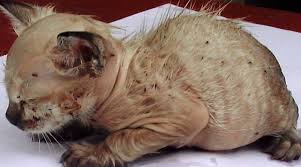 If you have the adult cat that's nursing them, you can use a traditional flea treatment on them. Just don't use any chemicals on the kittens!
If you have the adult cat that's nursing them, you can use a traditional flea treatment on them. Just don't use any chemicals on the kittens!
Lastly, you need to take care of the environment. This includes cleaning their bedding, treating your carpet or any place where fleas can hide.
Animal Radio News with Tammy Trujillo
Cancer In Our Pets
Cancer is one of the most common causes of chronic disease and death in middle-aged dogs and cats. Studies show that an estimated 33-percent of cats and 50-percent of dogs over the age of 10 may die from cancer. Some of the most common pet cancers are feline leukemia, various types of skin cancers and the most common in dogs is lymphoma. One expert says that pets get cancer as often as people do, especially now that they are living longer lives. And the treatments for pets are now mirroring those for people with cancer, including removing tumors, radiation or chemotherapy and rehabilitation to help pets post-surgery.
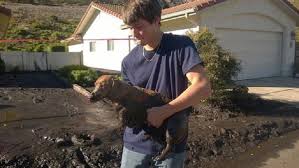 Dog Survived Mudslide
Dog Survived Mudslide
Some time ago the city of Camarillo, California was hit with heavy rain, causing a massive mudslide to crash down on a neighborhood. One home was seriously damaged and the owner had to be rescued from waist high mud. The family's dachshund couldn't be found and was feared dead. Days later, a family member was at what was left of the home when they heard barking and out came running a very muddy but otherwise okay dachshund. The house was filled with three feet of mud, so the fact that the dog survived was pretty much a miracle.
Flying Is Risky For Pets
The holidays are coming up fast and that means a lot of people will be flying. Many will be flying with their pets and that can be risky. The number of pets dying, getting hurt or lost during commercial air travel went up over the past several years, but seems to be declining. There are some types of dogs and cats that should avoid flying. Airline pressure can impact certain flat nose breeds more than others causing respiratory problems. They include: Boxers, Pugs, Pit Bulls, Chinese Pugs, Pekingese, and Bulldogs. Burmese, Himalayan and Persian cats are also on the list. Dogs and cats fly the most, but airlines also allow smaller pets like guinea pigs and rabbits. It's important to fly your pets in the cabin with you whenever possible and call the airlines at least 10 days ahead of your trip to find out if they need a health certificate or if there are any requirements regarding carriers.
Pet Ownership On The Rise
More than half of the people in the nation have at least one pet and they think of their pet as a joy, not a hassle. Nearly 66-percent of American adults have a pet, up just a bit from a year ago. Here's the breakdown: 49-percent have a dog; and 23-percent have a cat. 24-percent have more than one kind of pet. Only 3-percent have a fish, bird or some other sort of animal. An overwhelming majority of pet guardians, 92-percent say they talk to their pet.
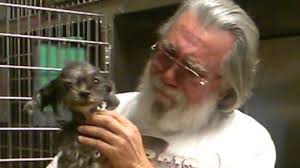 Microchipped Dog Returned After Eight Years
Microchipped Dog Returned After Eight Years
Here's another story to prove you should never give up on a lost pet. A couple in Atlanta got their Shih Tzu back eight years after last seeing him. The last time they saw their dog, it was just a puppy. They were sure someone snatched the puppy out of their backyard because suddenly their dog was was gone. The family did everything to find him, but no luck until animal services called to say the dog had been turned in as a stray. Luckily, their dog was microchipped, the key to his finally getting home.
 Listen to the entire Podcast of this show (#1250)
Listen to the entire Podcast of this show (#1250)





